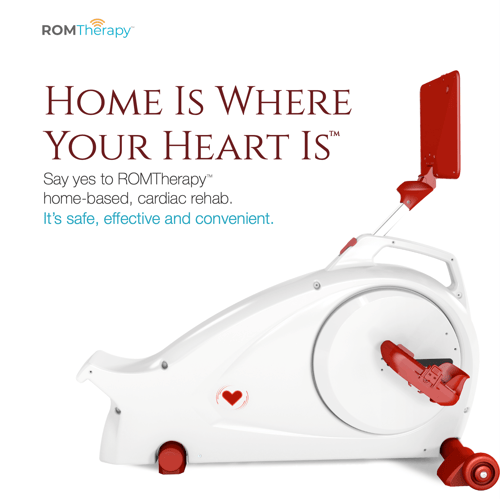Home-Based
Cardiac Rehabilitation
Cardiac rehabilitation is a medically supervised program designed to improve cardiovascular health after a heart attack, heart surgery, or other cardiac conditions. It combines physical activity, education, and support to help you recover safely, manage symptoms, and prevent future heart issues.
Why Cardiac Rehab?
Traditionally offered in clinical settings, Chicago Cardiology Institute now makes cardiac rehab more accessible than ever through our at-home program powered by RomTherapy. With guided exercise, real-time feedback, and professional monitoring in the comfort of your home, you can strengthen your heart and your future.
"Individuals who attend 36 sessions have a 47% lower risk of death and a 31% lower risk of heart attack than those who attend only 1 session."*
- Million Hearts®, a national initiative co-led by the Centers for Disease Control and Prevention (CDC) and the Centers for Medicare & Medicaid Services (CMS).
*Cardiac Rehabilitation at a Glance. Million Hearts®. (2020).
Is Home-Based Cardiac Rehab for You?
The following are the key diagnoses that qualify for rehab:
- CABG (Heart Bypass Surgery): No time limit for beginning rehab.
- Stable Angina Pectoris: No time limit for beginning rehab.
- Valve Replacement/Repair/TAVR: No time limit for beginning rehab.
- Heart Failure (EF < 35%): Early rehab is beneficial and has no time limit.
- Myocardial Infarction (MI): Ideal to start rehab within 1 year of the event.
- PTCA/Stent Placement: No time limit for beginning rehab.
Your healthcare provider can guide you on the best time to start based on your specific situation.
Chicago Cardiology Institute Has Partnered with RomTherapy to Bring You a Unique Home-Based Cardiac Rehab Solution
The RomTherapy PortableConnect® is a specialized, clinically validated device that brings your rehabilitation directly to your home. This system is designed to guide you through gentle, adaptive pedal exercises, ensuring your movements are precise and beneficial.
A key feature of the PortableConnect is its ability to keep you closely connected to your care team: you will be connected through live video calls and continuously monitor your vital signs. This integrated approach allows you to recover safely and comfortably, seamlessly incorporating your therapy into your daily routine.
Are You a Candidate for Home-Based Cardiac Rehab?
You may benefit from cardiac rehabilitation if you’ve experienced:
- A heart attack
- Angina or coronary artery disease
- Heart surgery (bypass, stent placement, or valve repair)
- Heart failure
- A pacemaker or ICD implant
We often recommend a home-based program for people who:
- Have limited access to a clinic
- Prefer to rehab in the comfort of your home
- Want flexibility without compromising quality of care
What to Expect for Your Home-Based Cardiac Rehab
Before
You’ll meet with your care team to review your medical history, set personalized recovery goals, and verify that at-home rehab is right for you. Once cleared, we’ll deliver the PortableConnect® to your home and provide step-by-step training.
During Use
Over the 4–8 week program, you’ll complete approximately 36 guided sessions—typically 3–5 per week. Each session includes gentle, structured pedal therapy, with your vital signs (heart rate, ECG, blood pressure, oxygen saturation) monitored in real time. Your cardiac rehab specialist will join via live video to supervise, support, and, if needed, adjust your exercise plan based on your progress.
This timeframe provides enough intensity and consistency to help patients rebuild cardiovascular strength, establish healthy routines, and complete the full cardiac rehab course—without extending into long-term use
After
At the end of your program, you’ll likely have stronger cardiovascular function, better mobility, and a personalized long-term wellness plan to maintain your heart health.

The Benefits and Risks of Home-Based Cardiac Rehab
Benefits of At-Home Cardiac Rehab:
- Improves heart function and overall endurance
- Supports safer recovery with professional oversight
- Reduces hospital readmission rates
- Convenient and accessible—no travel required
- Boosts confidence and independence
Encourages long-term heart-healthy habits
Risks to Consider:
- Mild muscle soreness after activity
- Rare risk of overexertion without proper supervision
- Requires adherence and engagement to be effective
Your cardiologist will help determine if home-based rehab is right for you, ensuring your program is both safe and effective.
Vein & Vascular Care
- Radiofrequency Ablation (RFA)
- Non-Thermal Adhesive Vein Ablation Procedures
- Non-Thermal Sclerosant Vein
- Stab Phlebectomy
- Sclerotherapy
Procedural Lab
(In-Office)
- Peripheral Angiogram
- Peripheral Angioplasty
- Peripheral Atherectomy
- Peripheral Vascular Intervention Procedures
- Renal Angiography